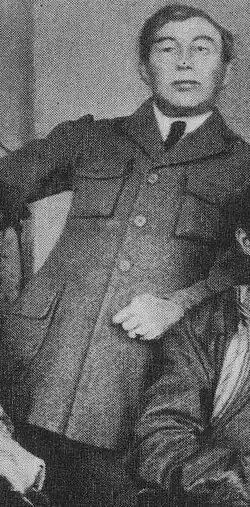Vladimir Khuva
Vladimir Khuva | |
|---|---|
 | |
| Native name | Владими Хува |
| Birth name | Vladimir Aleksandrovich Khuva |
| Born | Russian Empire |
| Allegiance | |
| Branch | Mongolian People's Army Red Army |
| Years of service | 1900s—1920s |
| Rank | Lieutenant Colonel |
| Battles / wars | Russo-Japanese War, World War I, Russian Civil War, Mongolian Revolution of 1921 |
Vladimir Aleksandrovich Khuva (Mongolian: Владимир Александрович Хува) was a Soviet and Mongolian military leader who was one of the earliest and most influential Soviet military advisors in Mongolia during the formative years of the Mongolian People's Republic. As Chief of the General Staff of the People's Army from September 1921 to September 1922.[1] He played a key role in organizing and modernizing the Mongolian Army following the Mongolian Revolution of 1921.[2]
Early life and military career
Little is known about Khuva's early life. He served as a lieutenant colonel in the Imperial Russian Army and participated in both the Russo-Japanese War and World War I. After the 1917 October Revolution, he joined the Bolsheviks and became a member of the Executive Committee of the Yenisei Soviet.
During the Russian Civil War, Khuva served as Chief of the Department of Reserve Armies in the Eastern Siberian Military District and later as an Infantry Inspector of the 5th Army of the RSFSR 5th Army.[3]
Service in Mongolia
In September 1921, Khuva was appointed Chief of Staff of the newly formed Mongolian People's Army. At the time, Mongolia lacked experienced military leaders and relied heavily on Soviet expertise to organize its forces. Khuva was one of the first high-ranking Soviet officers to assist directly in the training, structuring, and leadership of the Mongolian military. On April 24, 1922, Khuva was officially mandated by the Revolutionary Military Council, alongside Khorloogiin Choibalsan, to represent Mongolia in Moscow.[4]
His tenure marked a significant step in the institutional development of the Mongolian Armed Forces. Under his guidance, military units were restructured, staff training systems were implemented, and the defense capabilities of the fledgling state were expanded. After one year as Chief of Staff, Khuva was appointed head of the War Ministry and a member of the Revolutionary Military Council.[5]
Honors
- Order of the Red Banner (USSR)
- Order of Erdeni-Batchir (Mongolia)
References
- ^ Atwood, Christopher Pratt (1994). Revolutionary Nationalist Mobilization in Inner Mongolia, 1925-1929. Indiana University.
- ^ http://etoim.mn/p?id=4623.
{{cite web}}: Missing or empty|title=(help) - ^ ИнфоРост, Н. П. "Электронная библиотека исторических документов (ЭБИД) | Мандат, выданный Военным Советом МНР Х.Чойбалсану и В.А.Хува на право ведения переговоров о военной помощи Монголии со стороны РСФСР и о позиции РСФСР в случае конфликта между Китаем и Монголией. 24 апреля 1922 г." docs.historyrussia.org. Retrieved 2025-07-13.
- ^ ИнфоРост, Н. П. "Электронная библиотека исторических документов (ЭБИД) | Мандат, выданный Военным Советом МНР Х.Чойбалсану и В.А.Хува на право ведения переговоров о военной помощи Монголии со стороны РСФСР и о позиции РСФСР в случае конфликта между Китаем и Монголией. 24 апреля 1922 г." docs.historyrussia.org. Retrieved 2025-07-13.
- ^ Kuznetsov, Ilya I. (December 1999). "The Soviet military advisors in Mongolia 1921–39". The Journal of Slavic Military Studies. 12 (4): 118–137. doi:10.1080/13518049908430419. ISSN 1351-8046.
- ^ Козлов А. В., Савёлов И. И., Салихов А. Ш. «Приносили … армии огромную пользу, которая всегда должна подчеркиваться в истории как … заслуга». Награждение советских военнослужащих монгольским орденом Драгоценного Жезла в 1921—1924 гг.// Military Historical Journal. — 2023. — № 4. — С. 104—111.